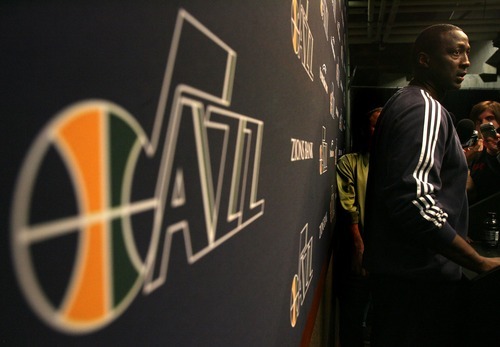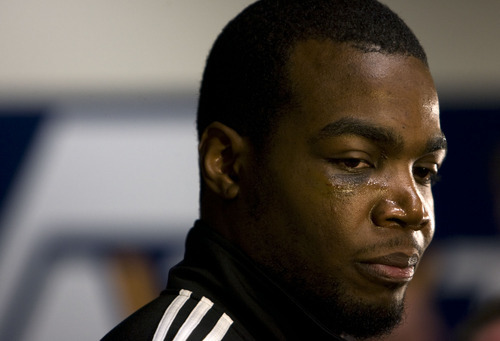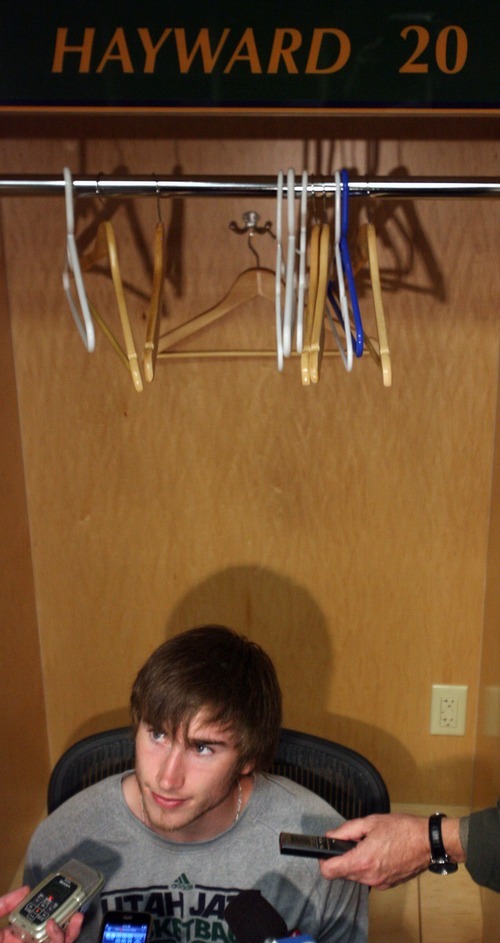This is an archived article that was published on sltrib.com in 2011, and information in the article may be outdated. It is provided only for personal research purposes and may not be reprinted.
The night before the Jazz boxed up and locked away the 2010-11 season, general manager Kevin O'Connor gathered together Utah's future.
Collecting Derrick Favors, Devin Harris and Al Jefferson at center court late Wednesday evening inside a raucous EnergySolutions Arena, O'Connor highlighted the possibilities.
He pointed out a rabid fanbase that was pleasantly "nuts," seats packed from the floor to the rafters, and an eardrum-popping standing ovation that screamed pure devotion. While confetti rained down and miniature basketballs were hurled like fastballs into the stands, O'Connor made his pitch: This is what it's like when we don't make the playoffs — just imagine the feeling you'll have when we do.
"Those guys appreciated that," said O'Connor, following exit interviews Thursday at ESA. "Going forward, that's something that's hopefully an incentive for them to use."
The Jazz have no choice but to move forward, after failing to qualify for the postseason for the first time since 2006. While 16 teams will continue to live NBA life in the playoffs, Utah is one of 14 dealing with a sudden end and bound for the lottery.
Two expected early selections in the 2011 draft, extra cash during free agency, and the late-season rise of rookies Gordon Hayward, Derrick Favors and Jeremy Evans have provided the organization with much-needed optimism following an un-Jazzlike season filled with chaos, drama and disappointment. But while O'Connor, coach Tyrone Corbin and 14 players spoke about potential and possibilities Thursday, a realistic but uncertain message was ultimately delivered during a five-hour interview session. Utah is excited about its prospects and ready to leave a lost 2010-11 behind. But the Jazz aren't sure what an already-hyped future will contain, how exactly they're going to get there, or what a team expected to undergo major change this summer will look like whenever a new season begins.
—
Starting over • Utah is starting from scratch, Corbin said. But despite coaching 28 games since taking over Feb. 10 for Jerry Sloan, Corbin is still not sure who composes the Jazz's core, nor which players the organization is going to build around for the long term. Hayward and Favors are likely no-brainers, while Harris and Jefferson were informed that they will be held more accountable in 2011-12. But the roles of everyone from Paul Millsap and C.J. Miles to Raja Bell are surrounded by question marks, while Corbin has yet to decide what style of basketball he wants his rebuilding team to play.
"We're trying to find out who we are," Corbin said. "We're still going to go ahead and see what we come back with next year in training camp — if we have a training camp, because of the lockout situation. But we're still developing. And we're going to have to be a group of guys that rely on each other until [a] guy develops or shows himself as a core guy."
Corbin was more authoritative when speaking with the media than he has been all season, and he transferred the message directly to his players. The first-year coach went 8-20 while searching for Utah's new identity, and still hasn't found what he's looking for. But one thing is certain: Corbin wants old-fashioned hard work to form the Jazz's new foundation. Anyone still wearing a Utah uniform at the start of 2011-12 must enter training camp in tune and in shape, and every position is up for grabs.
That's promising news for Hayward, who Corbin acknowledged could become the Jazz's starting shooting guard next season.
But it was also a reminder for veterans such as Miles, Bell, Millsap, Harris and Jefferson that life will be different next year.
"The main thing that we want all the guys to understand is that each guy has a responsibility to continue to get better," Corbin said. "And everybody need to get better, both offensively and on the defensive end."
Miles acknowledged that a lack of consistency remains a curse. Bell said that he did not meet his own expectations. Millsap will outwork anyone, but could split time between the small and power forward spots in the future. Meanwhile, Harris is still adjusting to a new environment and increased responsibilities.
Corbin wants all-around improvement from everyone. And he told his team to be ready to run from jump ball.
"You can't be out of shape and expect to get better," Corbin said. "So come in in the best condition that you can be in, so you can be prepared for anything that we can throw [at] you."
Jefferson said that the message hit home. He often carried the Jazz after All-Star guard Deron Williams was traded Feb. 23. But he entered training camp breathing heavy, and ran on tired legs at the end of 2010-11.
"That right there is a big major part of it," said Jefferson, who plans to address his vertical leap and lateral movement during the offseason while working out with teammates at Peak Performance Project, a high-tech human laboratory in Santa Barbara, Calif.
"Everybody in shape. Everybody trusting each other," Jefferson said. "Everybody knowing what the other person is going to do. … I think Ty hit it on the nail, exactly what we [have] to do."
—
Decision time • Utah has major work to do and much to decide. Lucking out in the 2011 draft could instantly and drastically alter the organization's future. Barring good fortune, though, hard decisions will be required.
O'Connor said that the Jazz are open to re-signing unrestricted free agents Andrei Kirilenko and Kyrylo Fesenko. But when asked about Utah's interest in picking up a team option worth $3.7 million on Miles, an immediate no comment followed.
Meanwhile, the hole in the Jazz's middle will not fix itself. A late-season trio of Millsap, Jefferson and Favors at times showed promise, but neither Corbin nor O'Connor are convinced that Millsap is destined to consistently play small forward in the NBA. O'Connor added that Utah is not looking to trade Millsap. Which leaves the team with three talented but similar players, while Jefferson and Millsap are undersized and struggled throughout the season to defend the paint when paired together.
Corbin stood by the duo Thursday. And the 19-year-old Favors' potential is stunning. But can the trio play together — and can the Jazz afford to leave Favors on the bench?
More questions. More possibilities. More uncertainty.
"We'll see what's available," Corbin said. "We're going to address things now with who we know we have. And those are the guys that we have, so we're going to continue to work and develop and try to get better with those guys."
bsmith@sltrib.comTwitter: @tribjazz Sticking around
2011-12
Player Salary Years remaining
Al Jefferson $14 million 2
Mehmet Okur $10.8 million 1
Devin Harris $9.3 million 2
Paul Millsap $6.7 million 2
Derrick Favors $4.4 million 4 (two on team option, one on qualifying offer)
Raja Bell $3.2 million 2
Gordon Hayward $2.5 million 4 (two on team option, one on qualifying offer)
Jeremy Evans $788,872 1
Total salary $51.6 million
2010-11 salary cap $58 million*
*2011-12 cap and luxury tax will not be determined until after a new Collective Bargaining Agreement is established. The current CBA expires June 30. —
To be determined
C.J. Miles • The Jazz hold a $3.7 million option on Miles for the 2011-12 season. Miles said Thursday after an exit interview that he expects to return to Utah, and plans to work harder than ever during the most important summer of his career. Jazz general manager Kevin O'Connor issued a quick no comment, though, when asked about the possibility of retaining Miles. —
Could be gone
Jazz 2010-11 unrestricted free agents:
• Andrei Kirilenko
• Ronnie Price
• Earl Watson
• Francisco Elson
• Kyrylo Fesenko —
Lucky day
The Jazz hold two lottery selections in the 2011 NBA Draft. Exact picks will be determined May 17, while the draft will be held June 23 in Newark, N.J.







